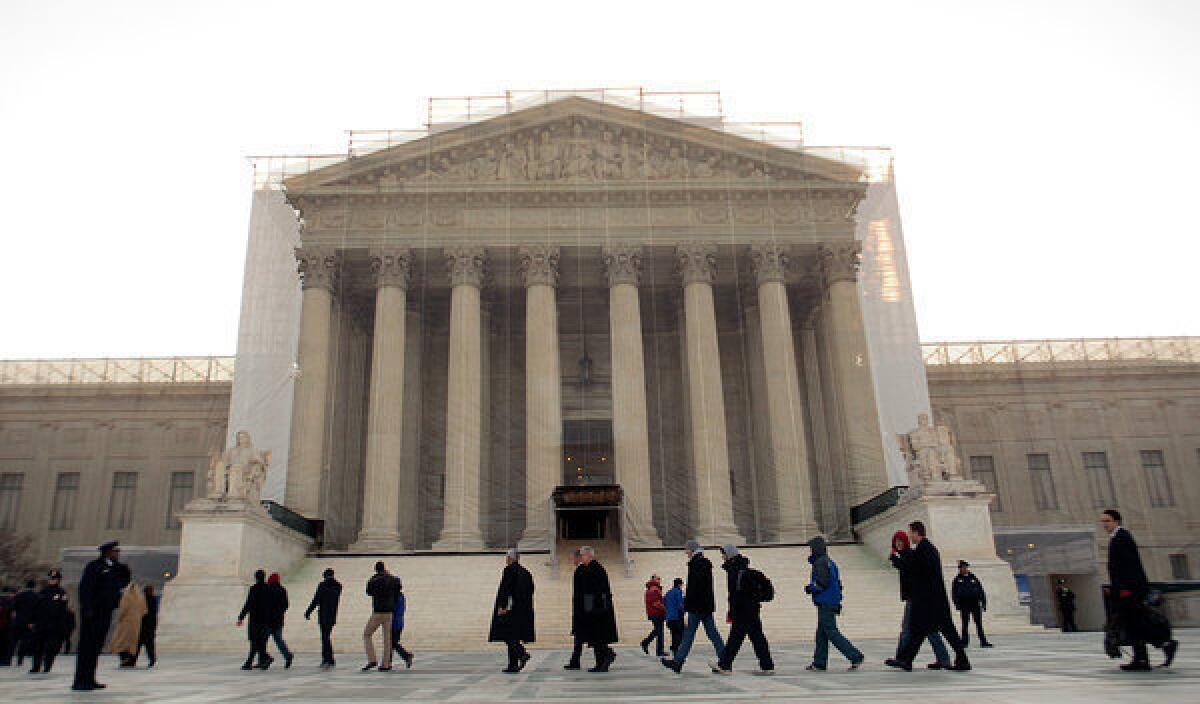Supreme Court to consider validity of patents on genes

- Share via
WASHINGTON -- The Supreme Court will hear an appeal Monday from breast cancer patients and medical researchers who say the U.S. Patent and Trademark Office made a mistake when it granted a Utah company an exclusive right to profit from testing genes that signal a high risk of cancer.
They argue that human genes are a product of nature not subject to being patented. Simply isolating gene mutations does not transform them into a useful invention, they say.
This case of patients versus patents has drawn extraordinary interest because of its potential to reshape the law on biotechnology and personalized medicine.
For more than 30 years, the patent office has granted patents to those who isolate living cells and make new uses of them, whether they deal with bacteria, plant seeds or human cells.
PHOTOS: Supreme Court considers gay marriage
Representatives of the biotech industry say these patents have spurred advances in medicine and agriculture. About half of the drugs in modern use and most anti-cancer drugs are derived from natural organisms, they say.
But the Supreme Court has grown increasing skeptical of patents and the apparent willingness of the patent office to grant inventors and innovators a 20-year monopoly over the use of formulas and processes.
Last year, the high court unanimously rejected a patent for a personalized-medicine-dosing formula that was held by Prometheus Labs. The justices said the formula, which relied on a blood test to guide doctors on the proper dose of a drug that treats auto-immune disorders, rested on a “law of nature” and therefore could not be patented.
“Einstein could not patent his celebrated law that E=MC2, nor could Newton have patented the law of gravity,” said Justice Stephen Breyer. “Such discoveries are ‘manifestations of ... nature, free to all men and reserved exclusively to none,’” he said, quoting from a 1948 opinion.
The justices then issued a one-line order telling a federal patent court to take another look at the gene patents held by Myriad Genetics, a company based in Salt Lake City that is at the center of the current case.
In 2009, the American Civil Liberties Union and the Public Patent Foundation had sued on behalf of the cancer patients and medical professionals to challenge the validity of Myriad’s gene patents. They argued that giving one company a monopoly control over a distinctive gene sequence resulted in patients paying too much for testing, and that it prevented them from getting a second opinion from other medical experts.
They lost in the federal circuit court that oversees patent appeals. It upheld Myriad’s patents in 2011, and it did so again last year, despite the warning from the high court. The patent judges held that the isolation of the particular gene mutation that signals a risk of cancer was a “new and useful” invention that can be patented.
Even though Myriad’s patents are due to expire within two years, the Supreme Court agreed to hear the case contending that genes cannot be patented.
The justices will hear attorneys from both sides on Monday. A decision in the case of Assn. for Molecular Pathology vs. Myriad Genetics can be expected by the end of June.
More to Read
Get the L.A. Times Politics newsletter
Deeply reported insights into legislation, politics and policy from Sacramento, Washington and beyond. In your inbox twice per week.
You may occasionally receive promotional content from the Los Angeles Times.











